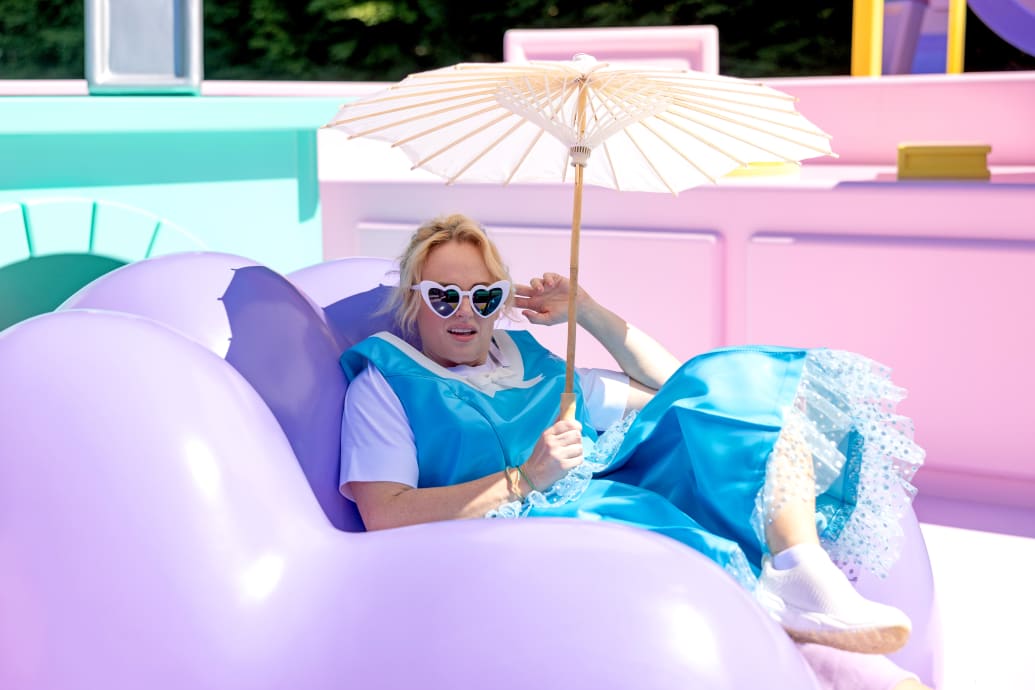TORONTO, Canada—Musicals are meant to make us forget real-life woes, right? Well, Rebel Wilson might be hoping so. The Pitch Perfect and Cats star brought her directorial debut The Deb–a lighthearted Australian musical in which she also stars–to the Toronto International Film Festival as the closing night film amid ongoing headline-grabbing drama.
This past summer, Wilson took to Instagram and accused two of the film’s producers of misconduct, embezzlement, and attempting to thwart the film’s festival premiere. Those producers denied Wilson’s claims and sued her for defamation. While The Deb doesn’t arrive with onscreen signs of behind-the-scenes turmoil, the original musical does land with a bit of an identity crisis.
The film takes its name for the tradition of teenage debutante balls, an event that its central outcast Taylah (newcomer Natalie Abbott) desperately awaits despite her lack of a date. A potential chaos agent arrives in the form of her cousin Maeve (Charlotte MacInnes), an influencer expelled for flashing her classmates as a form of protest against the school’s dress code. Maeve’s mother banishes her to Taylah’s drought-stricken town in the bush to suffer in the more conservative environment.
As Maeve faces cancellation from her former classmates for her borderline bullying tactics, she seizes a chance for redemption by shepherding Taylah to the “deb” of her dreams.

Rebel Wilson visits Polly Pocket’s Airbnb
Scott Eisen/Getty Images for Airbnb
And for much of the film, Wilson succeeds at giving us something enjoyably in the vein of an aughts-era charmer that goes down easy, like The Sisterhood of the Traveling Pants. Taylah and Maeve’s relationship is the film’s most satisfying element, with their bond growing tighter and getting tested in ways we expect, but can nevertheless root for. As Taylah, Abbott brings warmth and magnetism in her breakthrough role, never less than completely charming even when the film grates. MacInnes is also a delight as Maeve, giving fresh rascally flair to this duo of opposites.
The Deb wants to follow in the tradition of female-led, crowd-pleasing comedies as much as it does the traditions of musicals new and old. It pulls this off by sticking to trustworthy musical archetypes: the outsider with the heart of gold, the mean girl who learns to change, the benevolent dad. It may not be the most original terrain, but The Deb chooses a path that simply works.
Originality, however, is only the first stumbling block for the soundtrack. At a festival not lacking for musicals (from the post-apocalyptic The End to the maximalist Emilia Perez), The Deb is the lineup’s sore thumb in terms of its song score. Each of The Deb’s ditties thud with derivative fakery, even with frequently impressive choreography to distract us in the musical sequences. It all sounds like a hell wrought by the combined forces of chatGPT and Pasek and Paul asleep at the wheel.
But the subpar soundtrack also exposes the film’s cringe and confusion. With so many four letter words filling the lyric sheets it could make even Tarantino blanch, some of the songs sound like KidzBop without the content edited for younger ears. The jarring nature of the songs, caught between whitebread genericism and profanity, make you wonder who Wilson thinks this film is for—the tone is for tweens, but the content is for a dorm room.
It’s perhaps no surprise that Wilson finds a swear word to be itself a sufficient punch line, but there is a judgmental streak running through The Deb and its attempts at comedy. Whatever buoyant goodwill lies within the formula The Deb follows, Wilson stifles it with a mean-spirited perspective on its characters. There are moments of retrograde humor, like engaging in the slutshaming it decries elsewhere and mocking a child who “identifies as a koala.”
Wilson is often too quick to sacrifice consistency in the movie’s messaging all for the sake of cheap jokes that seldom land. This is especially true when it’s coming from Wilson herself on-screen, playing the town showmom Janette, a character so unpleasant and casually mean it kills much of the film’s uplifting vibe. Repeatedly, The Deb finds fun in being rather cruel.
The film detests the behavior of young people on the internet, but is itself chronically online. This is a musical where lyrics namecheck both the Bechdel test and manic pixie dream girls, striking a tone that is less a knowing wink than it is lacking in self-awareness. Worst yet, the film doesn’t know how to engage with the realities of teenagers in an online world without looking down its nose at them. The film holds a lot of its scorn for Maeve and her rampant influencer speak, and then teaches her a lesson in using the internet for good in a way that nevertheless feels scolding.
And this is the crux of the film’s confused state: Who is this film for if not young women like Maeve and Taylah, who the film often tears down for the very things it champions them for? Ultimately, it feels like The Deb despises the very audience that it is chasing most.




![Tyson Foods Plant [Photo: Food Manufacturing]](https://southarkansassun.com/wp-content/uploads/2023/08/iStock_1185520857__1_.5e441daa51cca-600x337.jpg)







![Silverado Senior Living Management Inc. [Photo: Los Angeles Times]](https://southarkansassun.com/wp-content/uploads/2023/10/download-6-4-600x337.jpg)

![China's Wuhan Institute of Virology [Photo: Nature]](https://southarkansassun.com/wp-content/uploads/2023/09/d41586-021-01529-3_19239608-600x337.jpg)
















